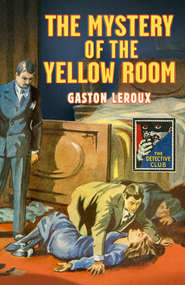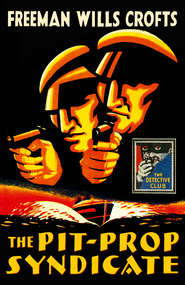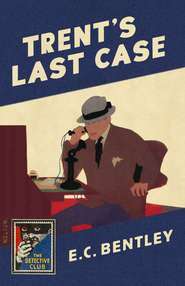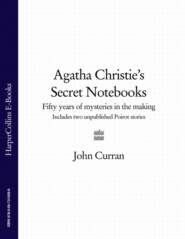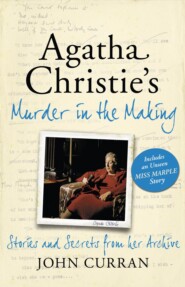По всем вопросам обращайтесь на: info@litportal.ru
(©) 2003-2024.
✖
The Leavenworth Case
Автор
Год написания книги
2019
Настройки чтения
Размер шрифта
Высота строк
Поля
Leading the way, he mounted the stairs, but stopped on the upper landing. ‘Mr Raymond,’ said he, ‘I am not in the habit of talking much about the secrets of my profession, but in this case everything depends upon getting the right clue at the start. We have no common villainy to deal with here; genius has been at work. Now sometimes an absolutely uninitiated mind will intuitively catch at something which the most highly trained intellect will miss. If such a thing should occur, remember that I am your man. Don’t go round talking, but come to me. For this is going to be a great case, mind you, a great case. Now, come on.’
‘But the ladies?’
‘They are in the rooms above; in grief, of course, but tolerably composed for all that, I hear.’ And advancing to a door, he pushed it open and beckoned me in.
All was dark for a moment, but presently, my eyes becoming accustomed to the place, I saw that we were in the library.
‘It was here he was found,’ said he; ‘in this room and upon this very spot.’ And advancing, he laid his hand on the end of a large baize-covered table that, together with its attendant chairs, occupied the centre of the room. ‘You see for yourself that it is directly opposite this door,’ and, crossing the floor, he paused in front of the threshold of a narrow passageway, opening into a room beyond.
‘As the murdered man was discovered sitting in this chair, and consequently with his back towards the passageway, the assassin must have advanced through the doorway to deliver his shot, pausing, let us say, about here.’ And Mr Gryce planted his feet firmly upon a certain spot in the carpet, about a foot from the threshold before mentioned.
‘But—’ I hastened to interpose.
‘There is no room for “but”,’ he cried. ‘We have studied the situation.’ And without deigning to dilate upon the subject, he turned immediately about and, stepping swiftly before me, led the way into the passage named. ‘Wine closet, clothes closet, washing apparatus, towel-rack,’ he explained, waving his hand from side to side as we hurried through, finishing with ‘Mr Leavenworth’s private apartment,’ as that room of comfortable aspect opened upon us.
Mr Leavenworth’s private apartment! It was here then that it ought to be, the horrible, blood-curdling it that yesterday was a living, breathing man. Advancing to the bed that was hung with heavy curtains, I raised my hand to put them back, when Mr Gryce, drawing them from my clasp, disclosed lying upon the pillow a cold, calm face looking so natural I involuntarily started.
‘His death was too sudden to distort the features,’ he remarked, turning the head to one side in a way to make visible a ghastly wound in the back of the cranium. ‘Such a hole as that sends a man out of the world without much notice. The surgeon will convince you it could never have been inflicted by himself. It is a case of deliberate murder.’
Horrified, I drew hastily back, when my glance fell upon a door situated directly opposite me in the side of the wall towards the hall. It appeared to be the only outlet from the room, with the exception of the passage through which we had entered, and I could not help wondering if it was through this door the assassin had entered on his roundabout course to the library. But Mr Gryce, seemingly observant of my glance, though his own was fixed upon the chandelier, made haste to remark, as if in reply to the inquiry in my face:
‘Found locked on the inside; may have come that way and may not; we don’t pretend to say.’
Observing now that the bed was undisturbed in its arrangement, I remarked, ‘He had not retired, then?’
‘No; the tragedy must be ten hours old. Time for the murderer to have studied the situation and provided for all contingencies.’
‘The murderer? Whom do you suspect?’ I whispered.
He looked impassively at the ring on my finger.
‘Everyone and nobody. It is not for me to suspect, but to detect.’ And dropping the curtain into its former position he led me from the room.
The coroner’s inquest being now in session, I felt a strong desire to be present, so, requesting Mr Gryce to inform the ladies that Mr Veeley was absent from town, and that I had come as his substitute, to render them any assistance they might require on so melancholy an occasion, I proceeded to the large parlour below, and took my seat among the various persons there assembled.
CHAPTER II (#u20167c21-19b4-523d-a4be-3b8628f3d827)
THE CORONER’S INQUEST (#u20167c21-19b4-523d-a4be-3b8628f3d827)
‘The baby figure of the giant mass
Of things to come.’
—TROILUS AND CRESSIDA
FOR a few minutes I sat dazed by the sudden flood of light greeting me from the many open windows; then, as the strongly contrasting features of the scene before me began to impress themselves upon my consciousness, I found myself experiencing something of the same sensation of double personality which years before had followed an enforced use of ether. As at that time, I appeared to be living two lives at once: in two distinct places, with two separate sets of incidents going on; so now I seemed to be divided between two irreconcilable trains of thought; the gorgeous house, its elaborate furnishing, the little glimpses of yesterday’s life, as seen in the open piano, with its sheet of music held in place by a lady’s fan, occupying my attention fully as much as the aspect of the throng of incongruous and impatient people huddled about me.
Perhaps one reason of this lay in the extraordinary splendour of the room I was in; the glow of satin, glitter of bronze, and glimmer of marble meeting the eye at every turn. But I am rather inclined to think it was mainly due to the force and eloquence of a certain picture which confronted me from the opposite wall. A sweet picture—sweet enough and poetic enough to have been conceived by the most idealistic of artists: simple, too—the vision of a young flaxen-haired, blue-eyed coquette, dressed in the costume of the First Empire, standing in a wood-path, looking back over her shoulder at someone following—yet with such a dash of something not altogether saint-like in the corners of her meek eyes and baby-like lips, that it impressed me with the individuality of life. Had it not been for the open dress, with its waist almost beneath the armpits, the hair cut short on the forehead, and the perfection of the neck and shoulders, I should have taken it for a literal portrait of one of the ladies of the house. As it was, I could not rid myself of the idea that one, if not both, of Mr Leavenworth’s nieces looked down upon me from the eyes of this entrancing blonde with the beckoning glance and forbidding hand. So vividly did this fancy impress me that I half shuddered as I looked, wondering if this sweet creature did not know what had occurred in this house since the happy yesterday; and if so, how she could stand there smiling so invitingly—when suddenly I became aware that I had been watching the little crowd of men about me with as complete an absorption as if nothing else in the room had attracted my attention; that the face of the coroner, sternly intelligent and attentive, was as distinctly imprinted upon my mind as that of this lovely picture, or the clearer-cut and more noble features of the sculptured Psyche, shining in mellow beauty from the crimson-hung window at his right; yes, even that the various countenances of the jurymen clustered before me, commonplace and insignificant as most of them were; the trembling forms of the excited servants crowded into a far corner; and the still more disagreeable aspect of the pale-faced, seedy reporter, seated at a small table and writing with a ghoul-like avidity that made my flesh creep, were each and all as fixed an element in the remarkable scene before me as the splendour of the surroundings which made their presence such a nightmare of discord and unreality.
I have spoken of the coroner. As fortune would have it, he was no stranger to me. I had not only seen him before, but had held frequent conversation with him; in fact, knew him. His name was Hammond, and he was universally regarded as a man of more than ordinary acuteness, fully capable of conducting an important examination, with the necessary skill and address. Interested as I was, or rather was likely to be, in this particular inquiry, I could not but congratulate myself upon our good fortune in having so intelligent a coroner.
As for his jurymen, they were, as I have intimated, very much like all other bodies of a similar character. Picked up at random from the streets, but from such streets as the Fifth and Sixth Avenues, they presented much the same appearance of average intelligence and refinement as might be seen in the chance occupants of one of our city stages. Indeed, I marked but one amongst them all who seemed to take any interest in the inquiry as an inquiry; all the rest appearing to be actuated in the fulfilment of their duty by the commoner instincts of pity and indignation.
Dr Maynard, the well-known surgeon of Thirty-sixth Street, was the first witness called. His testimony concerned the nature of the wound found in the murdered man’s head. As some of the facts presented by him are likely to prove of importance to us in our narrative, I will proceed to give a synopsis of what he said.
Prefacing his remarks with some account of himself, and the manner in which he had been summoned to the house by one of the servants, he went on to state that, upon his arrival, he found the deceased lying on a bed in the second-storey front room, with the blood clotted about a pistol-wound in the back of the head; having evidently been carried there from the adjoining apartment some hours after death. It was the only wound discovered on the body, and having probed it, he had found and extracted the bullet which he now handed to the jury. It was lying in the brain, having entered at the base of the skull, passed obliquely upward, and at once struck the medulla oblongata, causing instant death. The fact of the ball having entered the brain in this peculiar manner he deemed worthy of note, since it would produce not only instantaneous death, but an utterly motionless one. Further, from the position of the bullet-hole and the direction taken by the bullet, it was manifestly impossible that the shot should have been fired by the man himself, even if the condition of the hair about the wound did not completely demonstrate the fact that the shot was fired from a point some three or four feet distant. Still further, considering the angle at which the bullet had entered the skull, it was evident that the deceased must not only have been seated at the time, a fact about which there could be no dispute, but he must also have been engaged in some occupation which drew his head forward. For, in order that a ball should enter the head of a man sitting erect at the angle seen here, of 45 degrees, it would be necessary, not only for the pistol to be held very low down, but in a peculiar position; while if the head had been bent forward, as in the act of writing, a man holding a pistol naturally with the elbow bent, might very easily fire a ball into the brain at the angle observed.
Upon being questioned in regard to the bodily health of Mr Leavenworth, he replied that the deceased appeared to have been in good condition at the time of his death, but that, not being his attendant physician, he could not speak conclusively upon the subject without further examination; and, to the remark of a juryman, observed that he had not seen pistol or weapon lying upon the floor, or, indeed, anywhere else in either of the above-mentioned rooms.
I might as well add here what he afterwards stated, that from the position of the table, the chair, and the door behind it, the murderer, in order to satisfy all the conditions imposed by the situation, must have stood upon, or just within, the threshold of the passageway leading into the room beyond. Also, that as the ball was small, and from a rifled barrel, and thus especially liable to deflections while passing through bones and integuments, it seemed to him evident that the victim had made no effort to raise or turn his head when advanced upon by his destroyer; the fearful conclusion being that the footstep was an accustomed one, and the presence of its possessor in the room either known or expected.
The physician’s testimony being ended, the coroner picked up the bullet which had been laid on the table before him, and for a moment rolled it contemplatively between his fingers; then, drawing a pencil from his pocket, hastily scrawled a line or two on a piece of paper and, calling an officer to his side, delivered some command in a low tone. The officer, taking up the slip, looked at it for an instant knowingly, then catching up his hat left the room. Another moment, and the front door closed on him, and a wild halloo from the crowd of urchins without told of his appearance in the street. Sitting where I did, I had a full view of the corner. Looking out, I saw the officer stop there, hail a cab, hastily enter it, and disappear in the direction of Broadway.
CHAPTER III (#ulink_56497ce8-75a1-57e9-8303-0119cf0de5c7)
FACTS AND DEDUCTIONS (#ulink_56497ce8-75a1-57e9-8303-0119cf0de5c7)
‘Confusion now hath made his master-piece;
Most sacrilegious murder hath broke ope
The Lord’s anointed temple, and stolen thence
The life of the building.’
—MACBETH
TURNING my attention back into the room where I was, I found the coroner consulting a memorandum through a very impressive pair of gold eye-glasses.
‘Is the butler here?’ he asked.
Immediately there was a stir among the group of servants in the corner, and an intelligent-looking, though somewhat pompous, Irishman stepped out from their midst and confronted the jury. ‘Ah,’ thought I to myself, as my glance encountered his precise whiskers, steady eye, and respectfully attentive, though by no means humble, expression, ‘here is a model servant, who is likely to prove a model witness.’ And I was not mistaken; Thomas, the butler, was in all respects one in a thousand—and he knew it.
The coroner, upon whom, as upon all others in the room, he seemed to have made the like favourable impression, proceeded without hesitation to interrogate him.
‘Your name, I am told, is Thomas Dougherty?’
‘Yes, sir.’
‘Well, Thomas, how long have you been employed in your present situation?’
‘It must be a matter of two years now, sir.’
‘You are the person who first discovered the body of Mr Leavenworth?’
‘Yes, sir; I and Mr Harwell.’
‘And who is Mr Harwell?’






